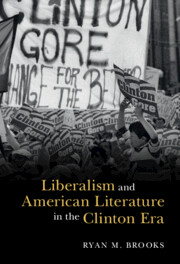Book contents
- Liberalism and American Literature in the Clinton Era
- Cambridge Studies in American Literature and Culture
- Liberalism and American Literature in the Clinton Era
- Copyright page
- Dedication
- Contents
- Acknowledgments
- Introduction
- Chapter 1 The Varieties of American Neoliberalism
- Chapter 2 “The Family Gone Wrong”
- Chapter 3 Post-political Form
- Chapter 4 “SUPERNAFTA” vs. “El Gran Mojado”
- Afterword
- Notes
- Index
- Recent books in this series
Chapter 3 - Post-political Form
Published online by Cambridge University Press: 16 June 2022
- Liberalism and American Literature in the Clinton Era
- Cambridge Studies in American Literature and Culture
- Liberalism and American Literature in the Clinton Era
- Copyright page
- Dedication
- Contents
- Acknowledgments
- Introduction
- Chapter 1 The Varieties of American Neoliberalism
- Chapter 2 “The Family Gone Wrong”
- Chapter 3 Post-political Form
- Chapter 4 “SUPERNAFTA” vs. “El Gran Mojado”
- Afterword
- Notes
- Index
- Recent books in this series
Summary
In this chapter, I show how Richard Powers’s 1998 novel Gain symbolically resolves the conflict between transnational corporate “stakeholders” and shareholders. In this way, the novel reveals what is already implicit in such “non-governmental” movements as “stakeholder activism,” which flourished during the 1990s in response to the rise of transnational corporations and right-wing critiques of the state. These non-governmental movements imagine a political field structured not by antagonism but by a plurality of interests, and they assume that these interests can be recognized and coordinated by a government (elected or corporate) that can somehow stand outside this realm of interests. I conclude this chapter by contrasting Gain’s post-political vision, as I call it, with that of Colson Whitehead’s Apex Hides the Hurt (2006), a novel about a “nomenclature consultant” hired to rename a small town. The novel’s resolution stages a rejection of the impulse to allow profitability to drive governance, and the discordant historical name selected by the protagonist — “Struggle” — also names the very thing hidden by corporate governance and non-governmental politics.
Keywords
- Type
- Chapter
- Information
- Liberalism and American Literature in the Clinton Era , pp. 104 - 133Publisher: Cambridge University PressPrint publication year: 2022



